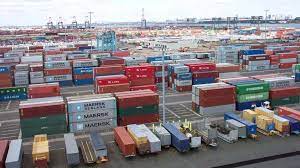Importation into the nation’s seaports dropped down to 65 per cent in the last two weeks, due to instability of foreign exchange and devaluation of naira, NATIONAL ECONOMY learnt.
Tin-Can Island Command of the Nigeria Customs Service (NCS) has said there is downturn in the cargo throughput at the nation’s seaports, thereby, making it difficult to meet its targeted revenue.
It was gathered that a dollar exchange for N1,200 in the black market and N848 in the Investors and Exporters(I& E) window.
Sources in the seaports have told our correspondent that berths in the Apapa and Tin-Can Island ports are empty, especially, in terminals that are handling bulk cargoes. Also, truckers have complained about drop in cargo haulage due to the decrease in import at the two busiest ports in the country.
A truck owner, Yusuf Liadi, said haulage of cargo laden containers in the last one months has fallen to the lowest level. “The last four weeks have been very challenging for truck owners. For instance, I have not moved cargoes out of the port in the last two weeks,” he lamented.
However, in an exclusive chat with NATIONAL ECONOMY, the former acting president of the Association of Nigerian Licensed Customs Agents (ANLCA), Dr Kayode Farinto, said importation has dropped to 65 per cent.
According to him, it was due to the volatility of the exchange rate even as he said removal of restriction placed on 41 items by the Central Bank of Nigeria (CBN) will boost import.
“Removing the restrictions on 41 items from accessing the forex market by the federal government is a welcome development and I do know that our import has dropped to 65 per cent in the last one or two weeks. But, lifting the restriction will encourage importers because placing prohibition on these items when they are not on import prohibition list was encouraging false declaration, corruption and adding to cost of cargo clearance.
“However, now that the importers know they can go abroad, bring these items and open Form M for it, then it’s an encouragement for the importers to do the right thing and I believe that will grow the nation’s economy as well,” he noted.
Farinto, however, predicted that import improvement based on the policy won’t be felt until middle of December 2023 or first quarter of 2024.
“It is a welcome development, it will grow the economy and increase the level of import into the country. It will take another 60 days to see the boost because import is not about going of the shelves to pick your import and we know a large chunk of our trade is to China and far East Asia so, before one can travel and come back, it will take another 60 days.
“It’s a welcome development that will boost the economy and increase the level of import. We should expect import boost between 1st and 2nd week of December and by middle of January, 2024, the effect will be massive.”
Also speaking, the president, National Council of Managing Director of Licensed Customs Agents (NCMDLCA), Lucky Amiwero, also corroborated that importation into the country through the nation’s seaports has dropped drastically.
Amiwero stated that no importer can import into the country at the current exchange rate of over N1,000 to a dollar.
According to him, due to the instability, they had to pay more to the customs if there is a change in foreign exchange before the clearance of the cargo.
“Exchange rate is moving very fast upward and you know most imports are contractual. Most of this imports are supposed to be paid back at a specific time and when you bring them in and you realise that before the cargoes arrive the country, there is an increase.
“The challenge is that there is no stability and because of that a lot of people are no more importing because of the floating exchange rate that is moving at a very high speed.
“Foreign exchange is a critical factor when a country is import dependent like Nigeria. This is because Nigeria is not a manufacturing country as we import almost everything. We need to aid import by giving export subsidies to survive.
“Exchange rate is one of the important factor affecting Importation because blaming Customs for low import is an act of ignorance. We cannot fault customs because they have not increased anything they only moved with the exchange rate.
“I saw agents protesting against customs and I told them it’s not customs’ fault but that of the economy. It’s the exchange rate and clearing agents must understand the dynamics of the economy. The exchange rate has a pivotal role to play, the exchange rate is not consistent, predictable and transparent. It’s is clumsy and shaky that importers have to stayed back to watch how things unfolds.
The Central Bank of Nigeria (CBN) has lot of work to do, to give confidence back to the system and ensure stability of the forex market. All the policies government are turning out daily are not practical or halting the free fall of naira.
“Now, the economy is fragile, import dominated and a lot of the people are getting poorer as poverty rate and purchasing power are going up daily,” he told NATIONAL ECONOMY.
Amiwero, however, demanded removal of impediments against seamless facilitation of exports out of the country, saying only import can balance Nigeria’s trade. “The country must be able to look at export through the impediments. Impediments such as pricing, evaluation, packaging among others must be tackled.”
“Government needs to remove obstacles to export. When the obstacles are removed, it will encourage export. Government should introduce subsidy on export for people to see it as an alternative and reduce over reliance on import because if export is not moving and no back up plans there will be problem, as we are currently experiencing,” he stressed.





